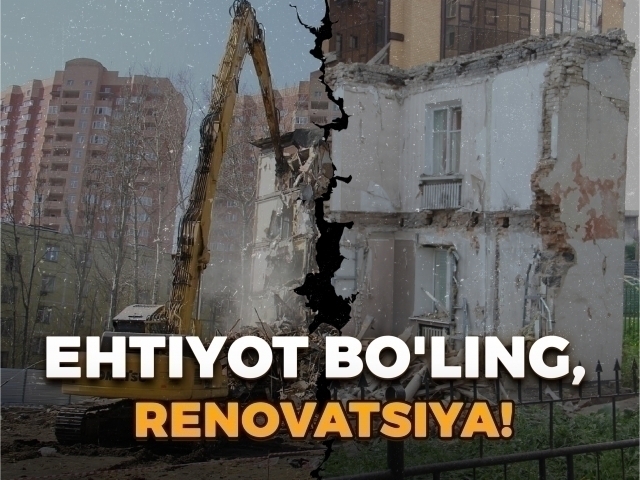Beware, renovation! The law on the inviolability of property was discussed
Review
−
01 August 2024 21798 9 minutes
In February, the law titled "On the Recognition of Rights to Arbitrarily Acquired Land Plots and Buildings and Structures Built Thereon" was developed and underwent its initial discussion. At that time, assurances were made that citizens' property rights would be safeguarded and property ownership rights would be reinstated. However, the government has unexpectedly reversed its position.
Recently, the Ministry of Justice drafted the "On Renovation of Urban Planning" law and published it on the discussion portal. Public activists and experts have criticized the new bill, noting that it contains significant flaws and "loopholes" that could potentially jeopardize private property further.
What is the Renovation Act?
During the 33 years since Uzbekistan's independence, numerous houses were demolished under the pretense of renovation, yet there was no formal renovation law in place. The new draft law aims to establish the following principles for urban planning renovation:
- Re-planning of land plots within urban development areas.
- Recognition that the residential and non-residential buildings in the renovation areas are unfit for habitation or use, and have reached a state of emergency.
- Addressing circumstances that significantly impact the social life of residents in the area.
- Acknowledging that the use of residential and non-residential facilities in the renovation areas has become inconvenient and inefficient.
- Ensuring that the engineering, communication, and social infrastructures of these buildings meet modern standards and energy efficiency requirements.
- Improving the architectural image and ecological condition of the urban planning renovation areas.
Economist Otabek Bakirov highlighted several shortcomings in the new draft law:
"At first glance, the project seems to follow several important criteria. For instance, it requires holding a general meeting of the property owners and obtaining the notarized written consent of at least two-thirds of them to proceed with the renovation. However, the minimum approval percentage for each multi-storey building within the area is not specified (a rule requiring at least 51% approval should be introduced for each multi-storey building).
Additionally, there is no requirement for a densification ratio or proportion of green space. In developed countries, renovations are based on increased density. An "anthill" housing 10,000 people should not be constructed in an area previously accommodating 1,000 people. The absence of an obligation to build additional kindergartens, schools, and clinics as part of the densification in the renovation area can exacerbate already serious social issues.
Furthermore, the compensation, whether in kind or cash, does not guarantee a minimum increase in market value. The draft law does not indicate that competition principles will be adhered to in the renovation process. This implies that without the introduction of auction or tender requirements, the renovation could be carried out by pre-selected partner contractors who have agreements with the authorities.”
According to Bakirov, citizens should carefully read this law and express their suggestions.
"In the capital and large cities, there are already no vacant plots of land left for construction. These plots have been searched by helicopter, divided, densified, sold twice, re-allocated, and donated. The next step for those in the construction-developer business and their partners in power will be to demolish old houses and build new ones. In some regions, particularly in Oktepa of Tashkent, this process has already started without the law. Know that the areas that need to be renovated are not where the rich or the bureaucrats live, but first and foremost, the areas where poor people live, who find it difficult to defend their territory and rights independently. At the same time, those areas that have been demolished, rebuilt, and sold for a large profit catch the eyes of the corrupt," says the economist.
What do the experts say?
QALAMPIR.UZ consulted urban planner Iskandar Soliev to gather expert opinions on the draft law "On Renovation of Urban Development." Soliev, a specialist in urban planning, reviewed each article of the law and detailed its shortcomings.
Article 4: The creation of engineering, communication, and social infrastructure that meets modern standards, and the improvement of energy efficiency indicators are mentioned.
Additionally, it should be specified as "For the needs of the Master Plan."
Article 5: At the individual initiative of the owners...
It should state "At the personal initiative of the owners (owners, housing owners' associations, and management service companies)."
Article 7: The main principles of urban planning renovation are provided, but there is no mention of the comprehensive development of the area.
Article 13: In the renovation project, it is necessary to consider the efficiency of land use when re-planning land plots. When placing buildings and structures, the principle of upward growth should generally be applied.
Article 18: Implementation of urban planning renovation, as well as the development of the renovation project, must align with the basic principles provided in this Law.
Renovation projects should propose an integrated approach to the development of a specific area, encompassing social infrastructure (kindergartens, schools, polyclinics), transport, and utility infrastructure development programs (from continuous pedestrian-friendly sidewalks to public transport routes).
This project should ensure the highest and best use of the area. Besides efficiency for the investor, the project must ensure budget efficiency. Density ratios must be considered to prevent the construction of skyscraper "anthills" where there were previously two-story houses. This should be clearly expressed in the text.
Article 31: To include a multi-apartment house in the renovation project, notarized written consent from at least two-thirds of the property owners must be obtained during the open discussion among the owners. If an agreement on the renovation projects included in the urban planning renovation program cannot be reached, compensation will be determined by the court.
In each multi-apartment, multi-floor building, at least 51% of the property owners must provide notarized written consent to include the house in the renovation project. If an agreement on the renovation projects included in the urban planning renovation program cannot be reached, compensation will be determined by the court.
Article 45: The procedure for compensation through ownership of a newly constructed residential or non-residential property in the area undergoing urban planning renovation is outlined as a settlement between the owner and the Directorate. When compensation is provided in the form of ownership of a newly built residential or non-residential property in the renovation area, the newly constructed properties, and their components are first offered for sale to these owners by the settlement agreement.
Apartment owners who agree to relocate to the renovation area must be assured that the construction, provision, quality, and condition of their new housing will not be significantly inferior to the building that the investors will construct for themselves in the renovation area.
For example, if the renovation area is completed tomorrow, the quality of the new housing provided to residents of the old location with their consent may be significantly different from the housing constructed by the investor in the renovation area. Such discrepancies are common in Russia. To prevent this issue, safeguards should be included in future decisions.
Two long-awaited laws
In 2018, following the relevant decree of the President of Uzbekistan, over 621,000 citizens were recognized as having the right to own homes built without proper authorization on arbitrarily occupied land, and cadastral documents were issued to them. However, a legal basis for ownership of property on such arbitrarily occupied lands had not been established.
By 2022, the law "On the Procedures for Seizing Land Plots for Public Needs in Exchange for Compensation" was enacted, establishing a procedure for compensating for property affected by demolition.
In February 2024, the draft law "On Recognition of Rights to Arbitrarily Acquired Plots of Land and Buildings and Structures Built on Them" was initially considered by the Legislative Chamber of the Oliy Majlis. According to current information, more than 126,000 citizens are awaiting a legal resolution to establish ownership of houses built without proper permission.
The draft law outlines the procedure for recognizing ownership rights to a plot of land and any building constructed on it, as well as the right to lease a plot of land on which a private house has been built and arbitrarily occupied.
It is significant that, should the rights to the arbitrarily occupied land plot and the buildings and structures thereon be recognized, the individuals who arbitrarily occupied the land are expected to be exempt from administrative responsibility.
Inviolability of property in Uzbekistan
In 2023, Uzbekistan was ranked 137th out of 142 countries in the "The government does not confiscate property without a court order and fair compensation" index compiled by the American organization, The World Justice Project. The country’s ownership system, however, is highly regarded.
Uzbeks are well aware of the issue of "Snos." It has become a frequent occurrence for properties, built with significant effort and investment, to be demolished before the owner's eyes. Authorities, ranging from the mayor’s office to internal affairs and the prosecutor's office, have been involved in such demolitions. In 2019, houses belonging to a group of citizens in the Payariq district of the Samarkand region were demolished. In May 2020, houses in the "Bunyodkor '' neighborhood area of the Yangiyol district, Tashkent region, were also destroyed. In the same year, homes in the Altinsoy district of Surkhandarya were affected. In 2021, shops located in the Yunusabad district of Tashkent city were demolished, and two apartments in Namangan city were similarly impacted. In 2022, trade and service outlets established by entrepreneurs in Yunusabad were destroyed. Numerous other instances of such demolitions can be cited. These practices adversely affect the country's image and deter potential investors from starting businesses in Uzbekistan.
The Law "On the Procedures for Expropriation of Land Plots for Public Needs" is still under review, and the Law "On Renovation of Urban Development" is currently under discussion. It remains to be seen whether these legislative measures will address public concerns or if the government will continue to undermine property rights.
Live
All
